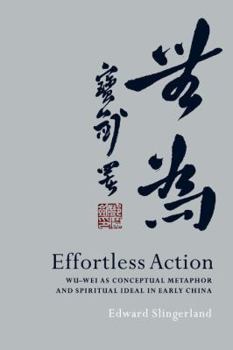Effortless Action: Wu-Wei as Conceptual Metaphor and Spiritual Ideal in Early China
Select Format
Select Condition 
Book Overview
This book presents a systematic account of the role of the personal spiritual ideal of wu-wei--literally "no doing," but better rendered as "effortless action"--in early Chinese thought. Edward Slingerland's analysis shows that wu-wei represents the most general of a set of conceptual metaphors having to do with a state of effortless ease and unself-consciousness. This concept of effortlessness, he contends, serves as a common ideal for both Daoist...
Format:Paperback
Language:English
ISBN:0195314875
ISBN13:9780195314878
Release Date:May 2007
Publisher:Oxford University Press
Length:368 Pages
Weight:1.13 lbs.
Dimensions:0.8" x 6.1" x 9.2"
Customer Reviews
0 rating





